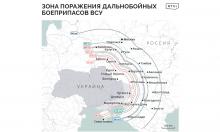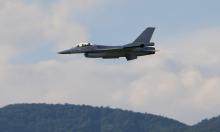"Washington Can Win the War But Has Already Lost Its Authority"
Elisa Carrio, Argentine presidential candidate, tells PRAVDA.Ru her interesting view on current world events. As anti-war rallies grow bigger, more voices in Latin America rise against the US-led strike on Iraq
"Baghdad can be many places in the world. Baghdad could be you", says Elisa Carrio, a hard woman who runs for president of Argentina without financial resources, but with great confidence. "U.S. has the force, but lacks of authority to head this war" told Carrio to PRAVDA.Ru, as she believes that world protests against the US-led war undermine Washington's symbolic power and could mean a retreat of the imperialist ruling.
Elisa Carrio agrees with the view that the fall of the United Nations means a serious danger for peripheral countries, as without UN institutions they cannot guarantee their territorial integrity and political sovereignty. "Therefore, the task is a joint action to stop the imperial advance of the United States", says Carrio, who is at the head of the local opinion polls, together with three other presidential candidates, for the incoming elections.
"This is the last chance for South America. We have to promote an active alliance with France and Germany against US policies. There is no space for neutrality: It is a matter of principles", says Carrio. But the Argentine politician is not the only voice against the war in Latin America. As anti-war demonstrations fill the streets, almost all the specialists and the largest portion of politicians agree with this view.
Many political leaders and citizens of Latin American countries have expressed their opposition to the US-led war in Iraq, and some warned the war and government support for the war would have serious consequences.
A joint statement of the foreign ministers of Cuba and Russia said both are worried over the US-led war against Iraq. In the statement, Cuban Foreign Minister Felipe Perez, who concluded a visit to Russia Tuesday, and he and his Russian counterpart Igor Ivanov said they favor solving the Iraqi crisis on the basis of UN Security Council resolutions, including Resolution 1441.
The US military operation in Iraq is part of a geopolitical strategy to shore up US hegemony over the Middle East, Guatemalan political analyst Armando de la Torre said on Tuesday. "The United States seeks to establish its dominion and political influence over the Middle East and, to this end, it has to oust Iraqi President Saddam Hussein", the analyst said.
In Nicaragua, local lawmakers want to pass a resolution to seek an international alliance of European and Latin American parliaments to halt US strikes on Iraq. The Sandinist Front of National Liberation said this party was to support protests to stop war against the Iraqi people.
Later this week, Venezuelan Foreign Minister Roy Chaderton said on Tuesday that a diplomatic solution to the standoff in Iraq remains possible. "It is a shame to see the death of civilians and combatants in Iraq. There still is time for diplomacy," Chaderton said at the 11th Ministerial Meeting of the Rio Group-European Union in Athens, Greece.
Hernan Plorutti, Argentine ambassador to Syria and Jordan, said on Tuesday that a prolonged war in Iraq would boost the prospect of a large-scale conflict in the Middle East. "People from different Arab and Muslim countries in general could be united behind Iraqi President Saddam Hussein in the fight against US troops in Iraq", the ambassador said in a telephone interview from Damascus, capital of Syria.
In a strong statement, the Argentine Peace Nobel Prize, Adolfo Perez Esquivel, criticized Bush, Blair and Aznar for heading a war that commits crimes against the humanity. "They lie to hide the horror and the death they are provoking", reads the statement. "How many deaths need Blair, Bush and Aznar to satisfy their appetite?" The question is hard to answer; the task, indeed, is to stop the massacre.
Hernan Etchaleco PRAVDA.Ru Argentina
Photo (AP): Anti-war protesters in Rio de Janeiro
Related links:
Subscribe to Pravda.Ru Telegram channel, Facebook, RSS!





